All signs point to an imminent escalation of Russia’s war with Ukraine with 100,000 troops ready on the countries’ shared border. As Western leaders look into deterring Vladimir Putin through different means from threats to appeasement, and as they are busy with diplomacy, war-planning, and designing sanctions, they are forgetting about the coming humanitarian crisis inherent to war. In 2015, a record 1.3 million people fleeing the wars in Afghanistan, Syria, and Iraq applied for asylum in Europe, creating the greatest humanitarian catastrophe since the end of World War II. The poorly managed crisis caused wide sociopolitical disruption in Europe and North America and contributed to the rise of right-wing populism. With the probable escalation of the war in Ukraine, it is astonishing how the human and political costs of such a recent experience are already forgotten and that there seems to be no preparation for the coming crisis. The institutional framework to prepare for and respond to a humanitarian crisis already exists through the European Union and the Organization for Security and Cooperation in Europe (OSCE). Specifically, the EU Commission includes a Civil Protection and Humanitarian Aid Operations department with an annual humanitarian budget of just over 1 billion euros. The Lisbon Treaty, one of the documents providing the legal basis of operations for the European Union, states that member states should cooperate in providing “assistance, relief, and protection of victims of natural and man-made disasters.” Through this basis, the EU also has the EU Civil Protection Mechanism, which coordinates with other countries and organizations providing civil protection in an area. Similarly, part of the OSCE’s makeup is an Office for Democratic Institutions and Human Rights (ODIHR), which works to assess, formulate, and implement migration policies and legislation together with participating states. The EU and OSCE are reactionary bodies dependent on formal requests to launch missions. This modus operandi is understandable when addressing unforeseen catastrophes or decisions requiring a consensus from member states. However, both organizations already have missions in Ukraine under which they could include the preparatory elements for a humanitarian and migratory crisis. The OSCE’s Project Coordinator supports Ukraine’s major transformations necessary for its continued stability and democracy, yet the project does not currently include a humanitarian or migratory angle. The EU’s mission in Ukraine is humanitarian in nature and is focused on specific day-to-day needs on the ground but is not prepared to treat Ukraine as a conflict zone. The current missions are valuable and necessary, but they lack the foresight needed to treat Ukrainian territory as a conflict zone, should it come to that. NATO is the correct body to prepare a defensive buildup and lead a response to Russian actions in the area. The EU and the OSCE are the correct bodies to address a humanitarian and migratory crisis in the region, and preparing beforehand for that possibility will save people’s lives.
NATO countries must employ their resources to participate in a preemptive strategy to address and mitigate the humanitarian crisis.
Security is not merely dependent on tanks and air support, but rather it encompasses broader economic and social protections that allow a state to function. In parallel to a defensive buildup, NATO countries must therefore also employ their resources to participate in a preemptive strategy to address and mitigate the humanitarian crisis. Now is the time to discuss how to correctly implement these policy instruments in ways we failed to in the past. And if the alliance’s ultimate goal is to preserve peace and security, its member states must use the existing organizations designed to address these non-military aspects of security and prepare for action in a similar way that militaries build up defenses. The time to have these conversations is now. Since 2014, and in violation of the 1994 Budapest Memorandum, Russia has occupied the Ukrainian region of Crimea with little more than verbal reprimands and tamed economic sanctions from Western states. The lack of accountability following the invasion has only added to Putin’s ambitious plan to reincorporate the former Soviet republics into Russia. Intentions that President Putin laid out in an open letter this summer. Putin has repeatedly sought to destabilize and weaken Western societies by employing grey zone tactics. Through the Gerasimov Doctrine, Russia publicized that it would have to emphasize non-military means such as disinformation, political influence, and energy and economic coercion to achieve its security goals fully. In this vein, Russia has continued a heavy stream of cyberattacks on Ukraine, including using malware to target the Ukrainian Army; targeting Ukrainian power grids to cause significant power outages; targeting government systems and uploading malware that, if downloaded, would allow hackers to take over a computer; and most recently, directly targeting and taking down Ukrainian government websites which cause internal chaos and the feeling that Russia already controls small elements of Ukrainian sovereignty.
We must use the organizations we have created to prepare for and respond to future crises, and the time to do so is now.
The West’s paralysis has also emboldened Putin in response to rogue behavior by his client-state, Belarus. In November 2021, President Alexander Lukashenko, with Russian support, created a humanitarian crisis on the border with Poland where hundreds of civilians were left to freeze to death. The EU limited its response to verbal condemnation of Lukashenko and rhetorical support for the migrants. In practice, it failed to mitigate the situation, partly due to Poland’s lack of cooperation. An echo of the 2010s, when the EU had no plans for the refugees from the Greater Middle East and Ukraine. Russia’s support for the Belarusian crisis is a clear example of Putin’s aim to discredit and rattle the EU. If he can combine another humanitarian crisis during the winter months to destabilize Western Europe while taking control of Ukraine, he will surely do so. Insanity is doing the same thing and expecting different results. It is easy to get bogged down in geopolitical strategies or tactical preparation against an adversary. Still, we must not forget that the transatlantic community came together to create organizations based on a set of shared values, organizations that have survived over seven decades. A realist perspective would highlight that these organizations arose for greater collective power given mutual needs. A human perspective would add that they arose to prevent the atrocities and devastation of which the human race is capable. We must use the organizations we have created to prepare for and respond to future crises, and the time to do so is now. And not just out of moral sentiments, but also self-preservation, given the disruptive effect of the previous crises. © IE Insights.











